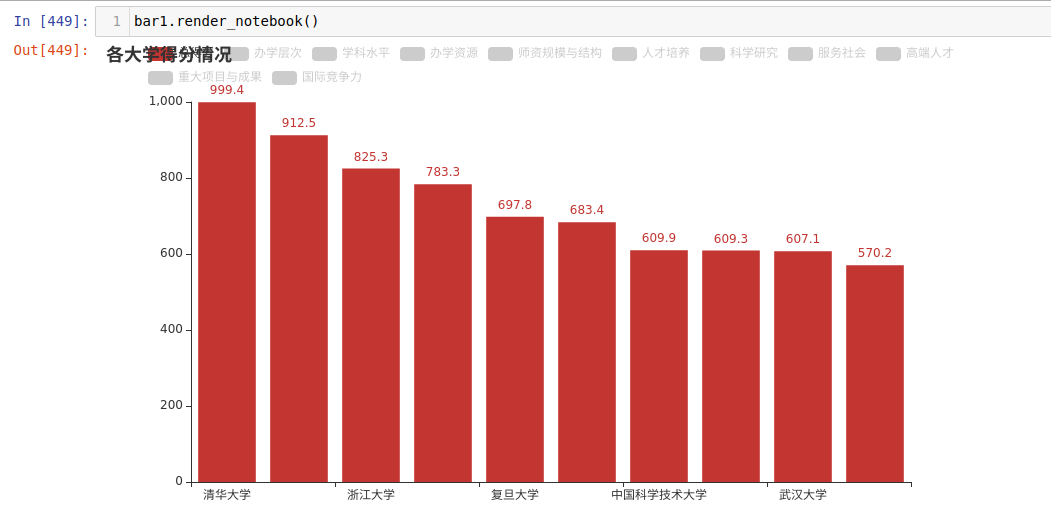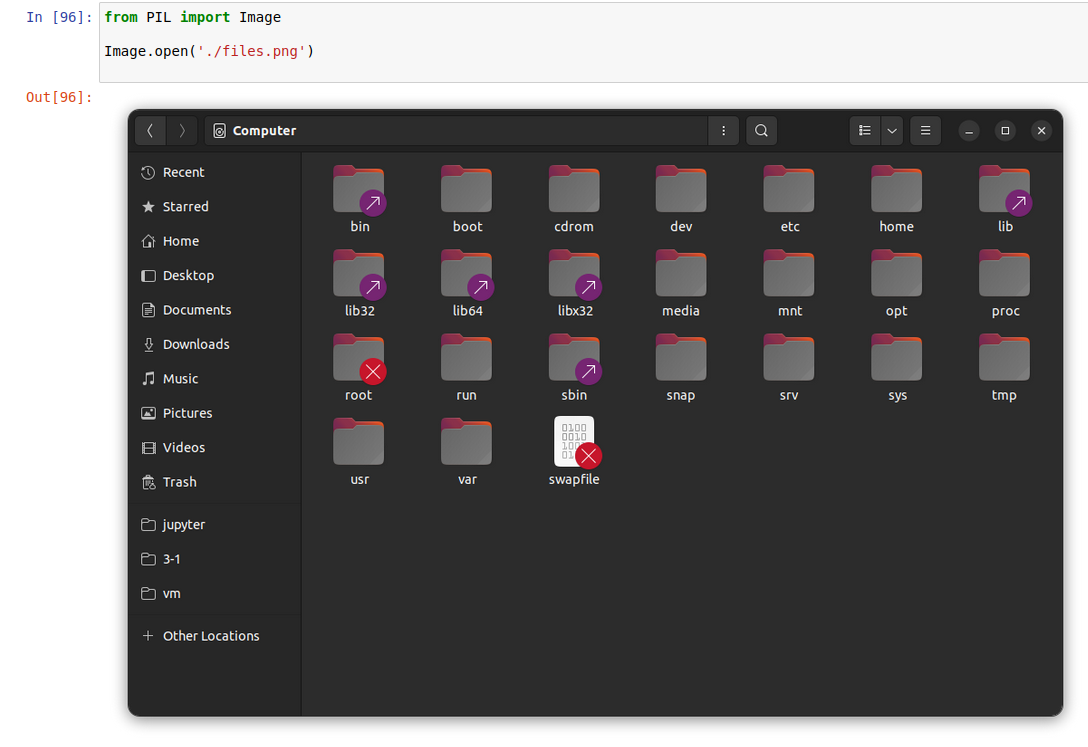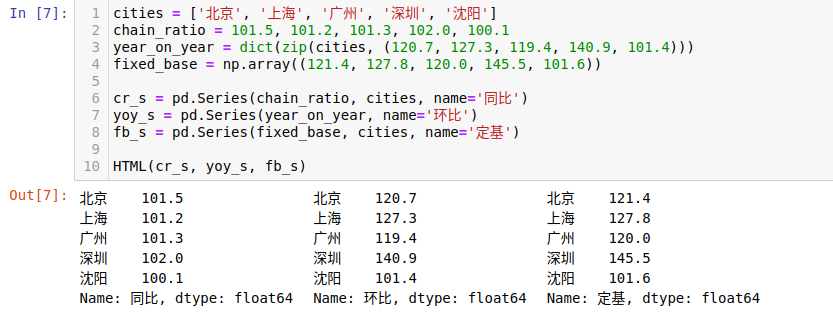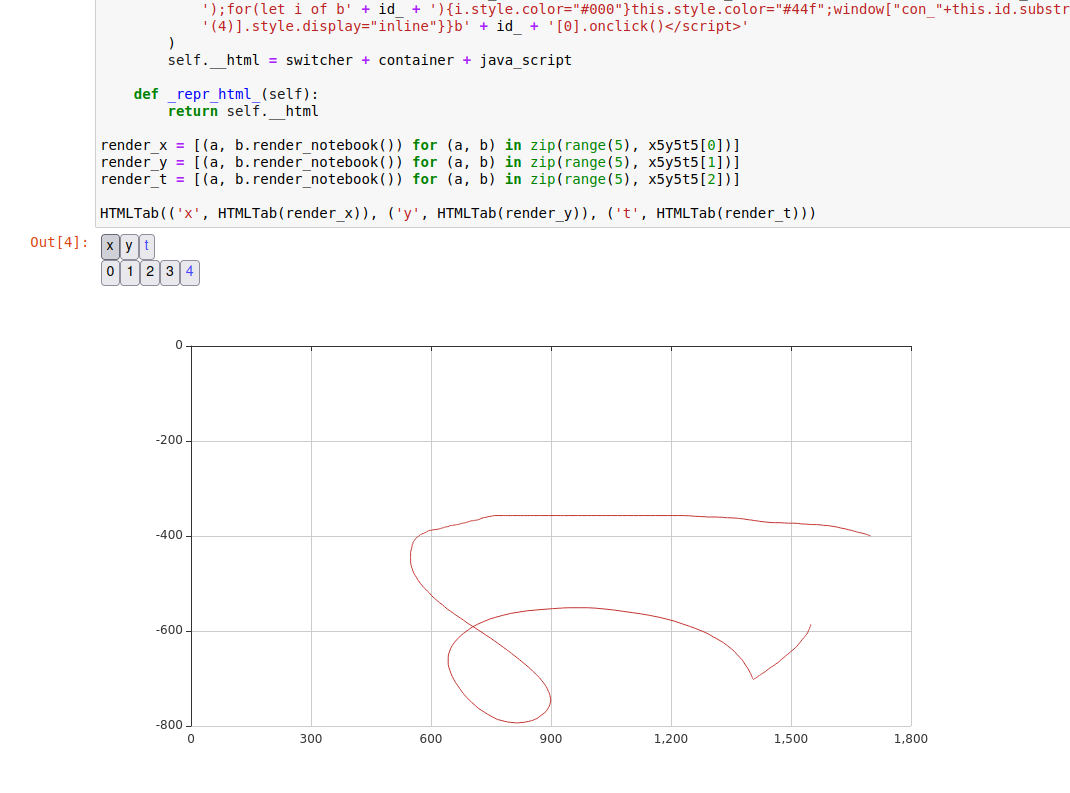在刚开始使用 Jupyter Notebook 时,我总想使输出结果更使人满意,而不是只把结果打印出来。在我知道可以用 HTML 输出之前,我是这样输出一个表格的(数据来源:软科中国大学排名)。
中国大学排名(主榜) 年份:2022 办 学 办 师资 人 科 服 高 重大 国 总 学 科 学 规模 才 学 务 端 项目 际竞 得 层 水 资 与结 培 研 社 人 与成 争 排名 学校名称 省份 分 次 平 源 构 养 究 会 才 果 力 ---- ------ --- --- --- --- --- --- --- --- --- --- --- --- 1 清华大学 北京 999.4 37.6 73.6 50.0 51.7 334.6 101.3 48.4 89.8 126.8 85.7 2 北京大学 北京 912.5 34.4 73.0 34.5 52.2 322.7 97.7 19.4 91.4 108.1 79.2 3 浙江大学 浙江 825.3 34.1 64.7 34.3 50.0 294.0 103.4 30.5 68.2 89.0 57.0 4 上海交通大学 上海 783.3 35.5 52.9 31.1 47.9 266.8 110.4 32.3 67.3 93.3 45.7 5 复旦大学 上海 697.8 35.9 48.0 23.8 50.2 262.8 87.9 15.3 62.5 61.6 49.6 6 南京大学 江苏 683.4 37.7 48.7 12.5 49.1 279.9 77.7 14.0 58.6 68.0 37.3 7 中国科学技术大学 安徽 609.9 40.0 37.4 16.4 46.6 234.6 75.8 9.4 55.1 41.7 53.0 8 华中科技大学 湖北 609.3 32.3 44.0 14.9 47.8 248.7 83.3 12.1 36.2 49.0 41.1 9 武汉大学 湖北 607.1 32.8 49.0 14.5 48.4 270.6 65.2 12.0 36.6 44.5 33.4 10 西安交通大学 陕西 570.2 34.2 41.0 16.7 47.6 258.8 57.0 19.4 25.9 40.4 29.3
输出部分的代码如下:
def output(cnt, extended_data):
rank_name, year, ind_map, k, univ_data = extended_data
output_data = univ_data[:max(0, min(cnt, len(univ_data)))]
# 打印表头
print(rank_name, f' 年份:{year}')
print(' ' * 19 + ' ' * 9, end='')
ik = list(map(lambda o: strB2Q(o.replace('(', '/').replace(')', '').strip()), k))
ip = ['\n 总 ', '\n 得 ', '\n 排名 学校名称 省份 分 ', '\n---- ------ --- --- ', '']
for j in range(4):
for i in ik:
i_len = len(i) + 1
print(f' {i[j * i_len // 4:(j + 1) * i_len // 4]: ^3} ', end='')
print(ip[j], end='')
for i in ik:
print(f' {"---": ^3} ', end='')
print()
# 打印数据
for i in output_data:
print(f"{i['ranking']:>3} {i['univNameCn']: ^10} {i['province']: >4} {i['score']:>5} ", end='')
for j in k:
print(f"{i['indData'][ind_map[j]]:>7}", end='')
print()
这样输出一个表格十分麻烦,要手动调整列宽等,而且输出结果也不十分美观。
但是我不知道有什么办法可以提升输出的质量,直到我使用 PyEcharts 时,我发现 PyEcharts 中的一个 render_notebook() 方法可以把结果用 HTML 的形式输出出来。

我也想让自己的输出结果更优雅,于是就开始扒拉 PyEcharts 的代码,最后我是用这样的方式知道如何输出 HTML 的:
dir(Bar().render_notebook())
上面这行代码输出了下面这些内容:
['__class__',
'__delattr__',
'__dict__',
'__dir__',
'__doc__',
'__eq__',
'__format__',
'__ge__',
'__getattribute__',
'__gt__',
'__hash__',
'__html__',
'__init__',
'__init_subclass__',
'__le__',
'__lt__',
'__module__',
'__ne__',
'__new__',
'__reduce__',
'__reduce_ex__',
'__repr__',
'__setattr__',
'__sizeof__',
'__str__',
'__subclasshook__',
'__weakref__',
'_repr_html_',
'data']
我注意到了一个 _repr_html_ 方法,于是我编写了一个测试类,其中声明了一个 _repr_html_方法,然后实例化它:
class Test:
def _repr_html_(self):
return '<div style="width:20px;height:20px;background-color:red"></div>'
Test()
果不其然,它正常工作了。下图是它的输出结果。

后来我发现不止有 _repr_html_,还有 _repr_png_、_repr_markdown_ 等,用这个方式可以让这类方法们显露无疑:
class ShowMeTheMethods:
def __getattr__(self, attr):
print(attr)
ShowMeTheMethods()
上面的代码输出结果如下:
_ipython_canary_method_should_not_exist_ _ipython_display_ _ipython_canary_method_should_not_exist_ _repr_mimebundle_ _ipython_canary_method_should_not_exist_ _repr_html_ _ipython_canary_method_should_not_exist_ _repr_markdown_ _ipython_canary_method_should_not_exist_ _repr_svg_ _ipython_canary_method_should_not_exist_ _repr_png_ _ipython_canary_method_should_not_exist_ _repr_pdf_ _ipython_canary_method_should_not_exist_ _repr_jpeg_ _ipython_canary_method_should_not_exist_ _repr_latex_ _ipython_canary_method_should_not_exist_ _repr_json_ _ipython_canary_method_should_not_exist_ _repr_javascript_
可以看到 Jupyter Notebook 调用了许多方法。除了 repr 开头的方法,还有一个 _ipython_display_ 方法和 一个 _ipython_canary_method_should_not_exist_ 变量。经过测试,如果类中存在 _ipython_canary_method_should_not_exist_,则不会调用以上的这些方法。关于 _ipython_display_ 方法,我没有深入研究过,在此就不展开说明了。
除了 _repr_html_ 之外,_repr_png_ 我也很常用。关于这个方法,其实我最早是在 PIL 库的 Image 对象中发现的。

dir(Image.open(./files.png))可以看到有一个_repr_png_方法。
现在我经常使用 HTML 的方式输出,写了一些输出的工具类,在这里做一个分享:
from base64 import b64encode
# 自定义输出类,让内容平铺而不是独占一行
class HTML:
__class_ind: int = 0
def __init__(self, *df):
class_ind = 'c' + str(HTML.__class_ind)
HTML.__class_ind += 1
self.html = '<div class="' + class_ind + '"><style scoped>.' + class_ind + '>pre,.' + class_ind + \
'>img,.' + class_ind + '>div{display:inline-block;margin-right:20px !important}</style>'
if len(df) == 1:
df = df[0]
for d in df:
if hasattr(d, '_repr_html_'):
self.html += '<div>' + d._repr_html_() + '</div>'
elif hasattr(d, '_repr_png_'):
self.html += '<img src="data:image/png;base64,' + b64encode(d._repr_png_()).decode() + '</img>'
else:
self.html += '<pre>' + str(d) + '</pre>'
self.html += '</div>'
def _repr_html_(self):
return self.html
效果:

# 可以切换输出显示的内容
class HTMLTab:
__id = 0
def __init__(self, *argv):
HTMLTab.__id += 1
id_ = str(HTMLTab.__id)
switcher = '<div class="switcher' + id_ + '">'
container = ''
cnt = 0
if len(argv) == 1:
argv = argv[0]
for i in argv:
switcher += '<button id="btn_' + str(cnt) + '__' + id_ + '">' + str(i[0]) + '</button>'
container += '<div class="container' + id_ + '" id="con_' + str(cnt) + '__' + id_ + '">' + \
(i[1]._repr_html_() if hasattr(i[1], '_repr_html_') else ('<pre>' + str(i[1]) + '</pre>')) + '</div>'
cnt += 1
switcher += '</div>'
java_script = (
'<script>var c' + id_ + '=document.querySelectorAll(".container' + id_ + '[id^=con_]"),b' + id_ + '=doc'
'ument.querySelectorAll(".switcher' + id_ + '>[id^=btn_]"),f' + id_ + '=()=>{for(let i of c' + id_ + ')'
'{i.style.display="none"}};f' + id_ + '();for(let i of b' + id_ + '){i.onclick=function(){f' + id_ + '('
');for(let i of b' + id_ + '){i.style.color="#000"}this.style.color="#44f";window["con_"+this.id.substr'
'(4)].style.display="inline"}}b' + id_ + '[0].onclick()</script>'
)
self.__html = switcher + container + java_script
def _repr_html_(self):
return self.__html
效果:




